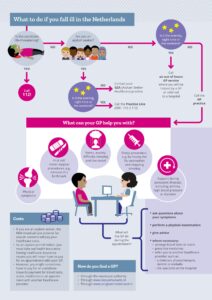How do I sign up for Dutch medical care?
If you are currently working in the Netherlands you will be automatically insured for the Long-Term Care Act and eligible for support through the Social Support Act if needed.
Upon registering with the municipality (gemeente), you will receive a social security number (BSN) that you will need to register for the mandatory Dutch health insurance. Applying can be done easily online, using this comparison tool: Compare and find a Dutch Health insurance.
Sometimes the insurance company will ask you to provide proof of residency, your passport or a letter from your employer.
Healthcare allowance
If your income is relatively low, you may be entitled for a healthcare allowance from the government. This benefit is arranged through the Dutch Tax Authority (Belastingdienst).

 If you would like to talk with somebody with IBD and/or ask your questions to somebody living in the Netherlands?
If you would like to talk with somebody with IBD and/or ask your questions to somebody living in the Netherlands? Go to the Menu of this website. The standard language is Dutch (NL), but you can also choose for English.
Go to the Menu of this website. The standard language is Dutch (NL), but you can also choose for English.